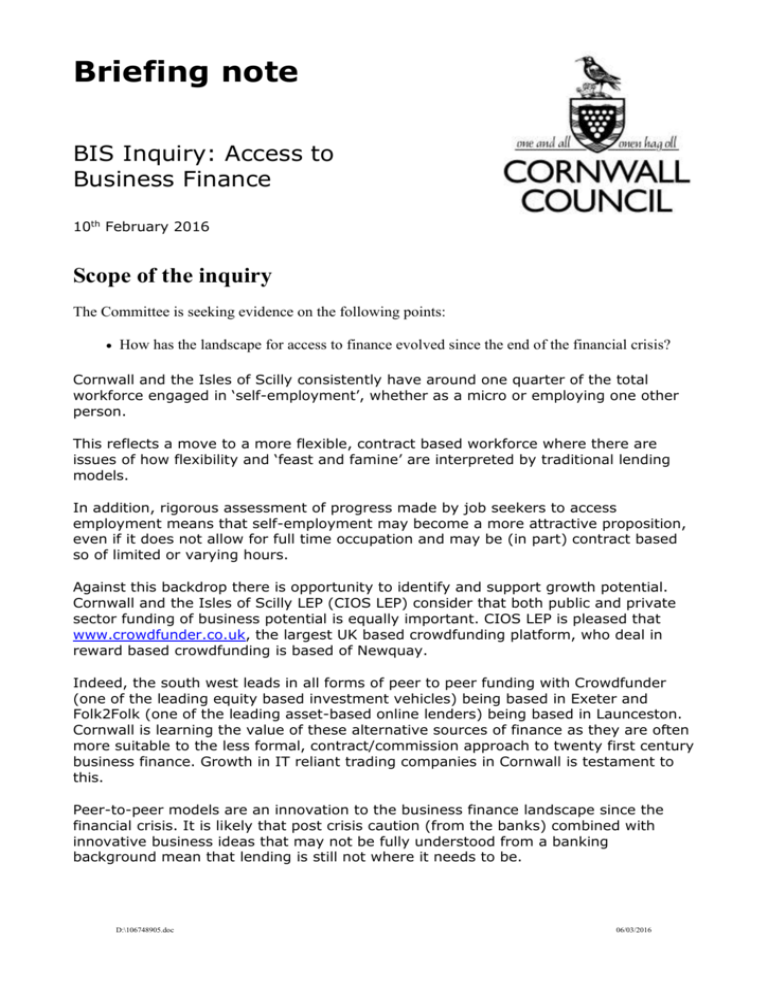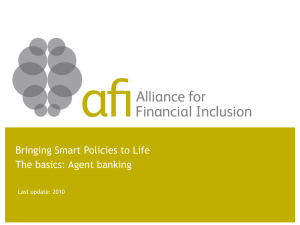BIS Inquiry: Access to Business Finance
advertisement

Briefing note BIS Inquiry: Access to Business Finance 10th February 2016 Scope of the inquiry The Committee is seeking evidence on the following points: How has the landscape for access to finance evolved since the end of the financial crisis? Cornwall and the Isles of Scilly consistently have around one quarter of the total workforce engaged in ‘self-employment’, whether as a micro or employing one other person. This reflects a move to a more flexible, contract based workforce where there are issues of how flexibility and ‘feast and famine’ are interpreted by traditional lending models. In addition, rigorous assessment of progress made by job seekers to access employment means that self-employment may become a more attractive proposition, even if it does not allow for full time occupation and may be (in part) contract based so of limited or varying hours. Against this backdrop there is opportunity to identify and support growth potential. Cornwall and the Isles of Scilly LEP (CIOS LEP) consider that both public and private sector funding of business potential is equally important. CIOS LEP is pleased that www.crowdfunder.co.uk, the largest UK based crowdfunding platform, who deal in reward based crowdfunding is based of Newquay. Indeed, the south west leads in all forms of peer to peer funding with Crowdfunder (one of the leading equity based investment vehicles) being based in Exeter and Folk2Folk (one of the leading asset-based online lenders) being based in Launceston. Cornwall is learning the value of these alternative sources of finance as they are often more suitable to the less formal, contract/commission approach to twenty first century business finance. Growth in IT reliant trading companies in Cornwall is testament to this. Peer-to-peer models are an innovation to the business finance landscape since the financial crisis. It is likely that post crisis caution (from the banks) combined with innovative business ideas that may not be fully understood from a banking background mean that lending is still not where it needs to be. D:\106748905.doc 06/03/2016 Banks are still competitive businesses in their own right, perhaps tempered by the financial crisis but still with the bottom line of delivering dividends for shareholders rather than supporting small business and communities. For example, a startup micro may have to rely on personal credit to make progress which immediately stymies further growth potential (and could also have personal consequences). Generally, access to business finance remains a major issue for businesses of most sizes in Cornwall. Personal finance can also weaken certainty for supply companies and all employees. The C&IoS LEP led interim Growth Hub www.ciosgrowthhub.com has included the most popular crowd funding and peer to peer solutions since its launch in July 2015, we expect the full Growth Hub to continue this relationship when it launches later in 2016. What have been the most successful Government policies to assist growing companies access private finance and where is there room for improvement? The Coalition government introduced a number of small business friendly initiatives such as extending small business rate relief, a cut in the small companies’ tax rate, the introduction of the Financial Conduct Authority and the creation of the UK business bank. The Small Business Act 2015 also helped by allowing any business denied a bank loan to be referred to a portal where alternative options were clear. The future of rate relief is likely to be influenced –in part - by the detail that will emerge on the policy of devolving 100% of business rate income to local authorities. Not all small businesses operate out of business premises but may need to do so in order to grow the business: thereby incurring a tax/cost. The ability to be able to cut business rates must be matched by local authorities and LEPs having the policy levers and flexibility to be able to support particular sectors or geographies in their areas. Small businesses also need support on being able to access payments from larger business late payers. Banks need to be linked back to local economies. In both the US and Germany there is a degree of transparency around local banking investment. The key point is that lower rates of return are expected in exchange for greater stability: the UK banking sector appears (at least historically) to have a reverse approach. Such flexibility can also support crises that local business may face: for example repeated flooding. Such an approach would also allow for the co-design of appropriate local products which could not be done by the ‘mainstream’ banking sector unless they were either broken up or more realistically regionalised. Government could also support a hybrid system whereby banks could regulate accounts that enable the peer-to-peer model rather than something completely informal. This could draw in some investors who may be partially but not wholly risk averse. Crucially, German banks have public interest criteria written into their constitutions. This is a devolved approach that obliges banks to invest in local businesses. Despite low rates of return these were nonetheless sustained during the banking crisis and D:\106748905.doc 06/03/2016 offer a more sustainable model for banks; avoiding significant costs to the taxpayer of nationalistion at times of crisis. Such an approach also helps the ethical investor (whether motivated socially, for return or both) invest in their local community. Does the UK have globally competitive markets / suppliers for financing (and debt financing) at 1) seed 2) venture and 3) growth stages? What steps could Government take to strengthen these systems? In part, there is referral to the previous answer. Not the entire banking/financial sector needs to be ‘globally competitive’: banking practices do need to be separated between what is globally competitive and internationally significant; with appropriate local investment which could deliver those future internationally competitive business models. Particular local finance models are needed to assist business ideas where a startup may appear ‘unconventional’ and/or is from an area of deprivation. State support for a ‘punt’ (with integrated guidance and support) may be worth the investment compared to the consequence to the taxpayer of years on welfare benefits. Where support is offered it appears to be spread across several Government departments (with responsibilities for different activities), so this needs to be rationalised. Data derived from the success or otherwise of various funding instruments and models needs to be monitored to develop policy and an understanding of success and failure, to enable better targeting and long term value for money. The role of ONS is crucial in this regard. Government could also guarantee SME bonds as a means for them to access finance; whilst the businesses retained ownership (other equity models may be off putting if faced with the potential loss of the business). Such an approach could be piloted as it is not currently applicable within the UK. It is worth noting that FSB research indicated that between 2007 and 2010 there was a 24% fall in the number of successful loan applications made by SMEs in the UK compared to a 9% fall in Germany; and that UK small business bank loans are rejected in the UK by a rate of about 50%. In contrast, research by NESTA and the University of Cambridge illustrated that the UK alternative finance market was worth over £1.7b in 2014 and was supporting over 7000 firms: still relatively small. Banks need to be aware that young entrepreneurial loyalty is eroding: further FSB research found that businesses created in the period 2010-15 are more likely to move their current accounts than those created pre 2000 (15% as opposed to 8%). Are alternative methods of raising finance (such as crowd-funding and peer-to-peer) sufficiently well-regulated and monitored for companies to be confident in utilising them? Peer to peer and crowd funding opportunities operate in a sophisticated and diverse market, supporting business models that may not be regarded as ‘traditional’. D:\106748905.doc 06/03/2016 For businesses with a great idea these methods represent a quick and easy way to market. Depending on the model they either provide a stakeholder experience of the product which can also act as a good marketing opportunity, and/or high dividend (but delayed) returns on capital invested at a time when conventional investment opportunities often face low interest rates. Regulation needs to be balanced against risk. These methods are an opportunity for relatively small investors to be able to support businesses and/or areas that they are passionate about but over regulation could damage these opportunities. It is important for potential investors to be clear on the risks to their capital and for redress to an independent regulation body for either party in the event of problems. While peer to peer can help overcome small business personnel own credit problems it can also mask (potentially) the perilous situation of some ‘larger’ investors. What are the main improvements or interventions, in terms of finance, that the Government should make to achieve the objective of increasing the number of successful and highgrowth businesses in the private sector? Tax relief needs to be supportive of high risk investment. HMRC needs to be adequately and locally resourced to respond to these aspirations, especially in those rural areas where broadband connectivity is still problematic and where diversification of agriculture is an opportunity. Please note that this response has been endorsed by Cllr Julian German, Cabinet member for the Economy and Culture (Cornwall Council). Prepared by: Stephen Horscroft Economic Planning and Strategy Officer Economic Development and Culture Transport, Planning, Economy and Enterprise Service 6 March 2016 D:\106748905.doc 06/03/2016






